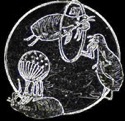 The attempt by a small group of climate cranks to bring a legal case against the New Zealand temperature record will leave the taxpayer to pick up a bill likely to run into hundreds of thousands of dollars, according to Radio NZ News yesterday. Efforts by the National Institute for Water and Atmospheric Research (NIWA) to recover court-ordered costs of $90,000 from the NZ Climate Science Education Trust (CSET) are virtually certain to fail according to the official liquidator, leaving the bill to be met by taxpayers. The Trust has no assets, and the prospects of any pay out are rated “unlikely”. But despite initiating the legal case and orchestrating the trust’s attempts to avoid meeting its liabilities, Barry Brill, the retired lawyer and former National Party politician who chairs the NZ Climate “Science” Coalition, is flying off to Las Vegas to speak at the latest climate crank networking event organised by far-right US lobby group the Heartland Institute.
The attempt by a small group of climate cranks to bring a legal case against the New Zealand temperature record will leave the taxpayer to pick up a bill likely to run into hundreds of thousands of dollars, according to Radio NZ News yesterday. Efforts by the National Institute for Water and Atmospheric Research (NIWA) to recover court-ordered costs of $90,000 from the NZ Climate Science Education Trust (CSET) are virtually certain to fail according to the official liquidator, leaving the bill to be met by taxpayers. The Trust has no assets, and the prospects of any pay out are rated “unlikely”. But despite initiating the legal case and orchestrating the trust’s attempts to avoid meeting its liabilities, Barry Brill, the retired lawyer and former National Party politician who chairs the NZ Climate “Science” Coalition, is flying off to Las Vegas to speak at the latest climate crank networking event organised by far-right US lobby group the Heartland Institute.
The latest report from the official liquidator (pdf) makes it obvious that the CSET was formed with the express intention of bringing the court action and as a cover to protect the litigants from the financial consequences of failure. It also raises serious questions about the way that the case was funded. The evidence is damning:
- The CSET’s statement of claim against NIWA was filed with the High Court on July 5th, 2010.
- The CSET’s deed of trust is dated July 30th – more than three weeks after the case was filed in its name.
- The CSET was not officially registered as a trust until August 10th, 2010.
- The CSET did nothing except bring an action against NIWA.
In addition, according to the liquidator’s report, the CSET had no assets, did not receive or disburse any monies, and did not keep any financial records. But CSET trustee Bryan Leyland told the Sunday Star Times in January:
We spent a large amount of money on the court case, there were some expensive legal technicalities.” Funding had come “from a number of sources, which are confidential”.
The statements made to the liquidator tell a different story:
The trustees were questioned about how the charitable trust funded the legal proceedings against NIWA. They advised that all legal advice and representation was provided on a pro bono basis and Mr Brill paid for the court fees personally.
Leyland’s comments to the SST are clearly not compatible with the statements made to the official liquidator. If a “large amount of money” was spent on the case, but legal representation was provided pro bono, where was the money spent and why was it not channeled through the trust and properly recorded in the CSET’s accounts? Either Leyland was misleading the Sunday Star Times, or he was misleading the official liquidator.
Continue reading “Brill’s bills still unpaid, but Barry’s off to Vegas”
Like this:
Like Loading...
 There is much ado at Tannochbrae Manor, because the Laird has once again disproved global warming. One equation is all it takes! And an article in a new Chinese science journal with some friends, and lo!
There is much ado at Tannochbrae Manor, because the Laird has once again disproved global warming. One equation is all it takes! And an article in a new Chinese science journal with some friends, and lo!
 The attempt by a small group of climate cranks to bring a legal case against the New Zealand temperature record will leave the taxpayer to pick up a bill likely to run into hundreds of thousands of dollars, according to
The attempt by a small group of climate cranks to bring a legal case against the New Zealand temperature record will leave the taxpayer to pick up a bill likely to run into hundreds of thousands of dollars, according to  New Zealand’s
New Zealand’s  As
As  Big fleas have little fleas,
Big fleas have little fleas,